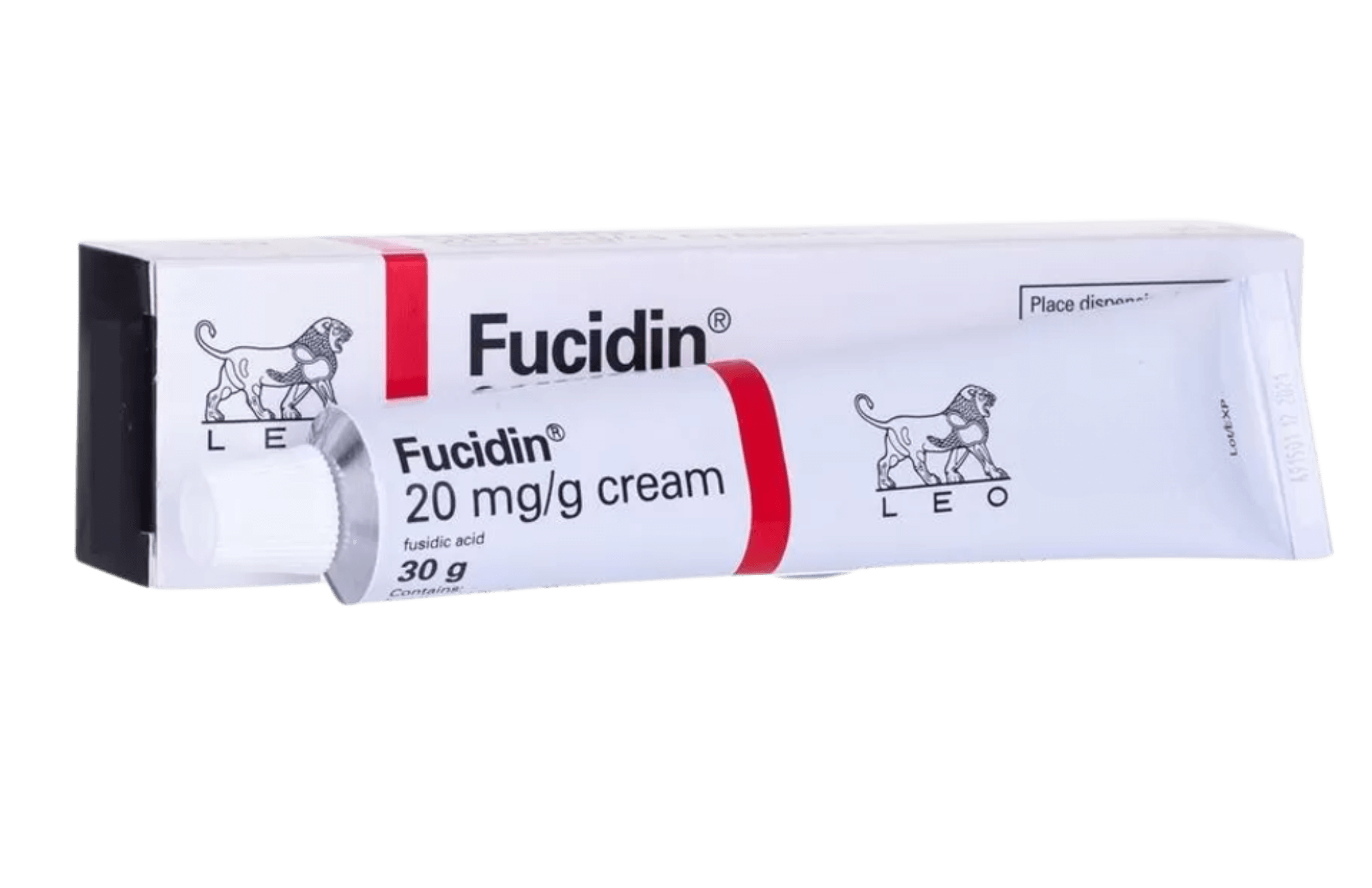Fucidin Cream (generic name: fusidic acid) / Fucidin Ointment (generic name: sodium fusidate) are topical antibiotic medications primarily used to treat bacterial skin infections. They are is available in two formulations: Fucidin Cream and Fucidin Ointment, each designed for specific types of skin conditions.
Fucidin works by inhibiting bacterial protein synthesis, effectively targeting and eliminating Staphylococcus aureus and other susceptible bacteria responsible for skin infections. This action helps resolve infections and prevent their spread.
Fucidin is indicated for the treatment of various skin infections, including impetigo, infected dermatitis, and infected cuts and grazes.
- Fucidin Cream is formulated for treating moist, weeping skin lesions. Its water-based composition allows for easy application and absorption, making it suitable for infected eczema and dermatitis.
- Fucidin Ointment is designed for dry, scaly, or crusted lesions. Its oil-based formulation provides a moisturizing effect, beneficial for conditions like impetigo and infected cuts.
Dosage and Administration
Follow the prescribing physician’s instructions. The typical application of Fucidin depends on the formulation and the nature of the infection:
- Fucidin Cream: Apply a thin layer to the affected area three to four times daily. This formulation is suitable for moist or weeping lesions due to its lighter, water-based consistency.
- Fucidin Ointment: Apply a thin layer to the affected area two to three times daily. The ointment’s oil-based composition is ideal for dry, scaly, or crusted lesions, providing a moisturizing effect.
Application instructions
- Clean and dry the affected area gently before application.
- Apply a thin layer of the cream or ointment to the infected area.
- Wash hands thoroughly after application, unless the hands are the treated area.
If a dose is missed, apply it as soon as remembered. If it’s near the time for the next application, skip the missed dose and resume the regular schedule. Do not apply a double dose to compensate for the missed one.
Storage
Store Fucidin Cream and Ointment at room temperature, below 82°FC (30°C). Keep the medication in its original tube and packaging to protect it from light and moisture. Once opened, the tube should be discarded after three months to ensure effectiveness and prevent contamination.
Common Questions About Fucidin
Is fusidic acid a steroid?
No, fusidic acid is not a steroid; it is an antibiotic used to treat bacterial skin infections.
What is impetigo, and how does Fucidin help?
Impetigo is a
contagious bacterial skin infection characterized by weeping, crusty, and swollen patches. Fucidin treats impetigo by targeting and eliminating the bacteria causing the infection
Can I use Fucidin on my face?
Yes, Fucidin can be applied to facial areas affected by bacterial infections; however, avoid contact with the eyes. If any Fucidin reaches the eyes, immediately wash it out with water.
This text is for informational purposes only. Please consult a doctor or pharmacist before using any medication.
Read the information leaflet that comes with the medication.
If a sudden allergic reaction (anaphylaxis) occurs after using Fucidin, with symptoms like swelling of the face, tongue, or throat making it difficult to breathe or swallow, or there is wheezing, hives, rash, blistering, or peeling of the skin, call a doctor or 911 right away, or go to an emergency room immediately.
Most people who use Fucidin do not experience any adverse side effects. Doctors prescribe this medication because they assess the benefits of such treatment outweigh any likely unwanted effects.
Some of the side effects that have been reported include mild irritation, itching, or redness at the application site.
Not all side effects are listed here. If these or other unlisted symptoms persist or worsen, consult a healthcare provider or pharmacist.
Fucidin is effective against various bacterial skin infections:
- Impetigo, characterized by red sores that quickly rupture, ooze, and form a yellowish-brown crust. Impetigo commonly affects infants and young children but can occur in individuals of any age.
- Infected dermatitis and eczema – conditions where inflamed skin becomes secondarily infected, leading to increased redness, swelling, and possible pus formation.
- Infected cuts, grazes, and wounds – minor skin injuries that have become contaminated with bacteria, resulting in redness, swelling, and pain.
Considerations
Consult a healthcare professional before using Fucidin during pregnancy or while breastfeeding.
Prolonged use may lead to skin sensitization or resistance; therefore, it should be used as directed. If there is no improvement in the infection after the prescribed treatment period, consult a healthcare professional for further evaluation.













